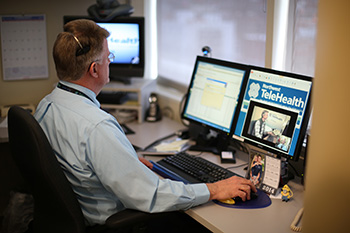Funding For Health Care Tech Companies Climbs
 CHICAGO — With telehealth gaining momentum in the health care industry, funding for on-demand health care companies that provide services 24/7 is climbing drastically. The funding for these companies is expected to quadruple in the next couple of years, and by 2017, there will be more than $1 billion in investment capital, according to a report from Accenture. Companies like Kaiser Permanente have already invested approximately $4 billion in building the company’s “HealthConnect” platform, which will allow members to access real-time access to medical records as well as providing in-home monitoring and virtual consultants.
CHICAGO — With telehealth gaining momentum in the health care industry, funding for on-demand health care companies that provide services 24/7 is climbing drastically. The funding for these companies is expected to quadruple in the next couple of years, and by 2017, there will be more than $1 billion in investment capital, according to a report from Accenture. Companies like Kaiser Permanente have already invested approximately $4 billion in building the company’s “HealthConnect” platform, which will allow members to access real-time access to medical records as well as providing in-home monitoring and virtual consultants.
“On-demand health care is fundamentally changing — and enriching — the doctor-patient relationship, making the physician much more accessible to patients while simultaneously reducing costs,” Kaveh Safavi, M.D., J.D., senior managing director for Accenture’s global health business, said in a statement. “With no end to this type of investment in sight, there’s an enormous opportunity for companies to offer fast, convenient and customized user-experiences that ultimately improve the patient experience and outcomes.”
With the maturation of technology, on-demand health care has become a more cost effective and easy way to provide services to patients. According to Accenture’s research, approximately 190 million people in the United States use smart phones, and the number continues to rise. With a large population of people using smart phones, Accenture expects the demand for mobile health services to rise as well.
The on-demand health care system will not only allow patients to schedule their appointments online and reach their medical records in an instant, but it will also provide patients the opportunity to have video conferences with their physician as well as virtual therapy, according to Accenture. The technology will provide a cost effective, quick and convenient way to access health care.
Since 2000, the top 230 on-demand companies have raised more than $12.5 billion in funding, which is distributed across six main sectors; auto and transportation, food and drink, health, household chores, logistics, and professional services. Excluding the transportation industry, health care is the fastest growing on-demand sector and represents one-fifth of total U.S. funding. With that, the number of on-demand health care companies has grown from four in 2010 to 42 in 2014. Annual investment in on-demand health care is growing at approximately 224 percent annually, according to research from Accenture. Since 2010, primary care has totaled more that $638 million in funding. Also, specialty care, behavioral health care and wellness and veterinary companies have received approximately $68 million in funding from the U.S. since 2010.
The growth is caused by not only the younger generations interested in the benefits of on-demand health care, but according to Accenture’s research, approximately 57 percent of seniors are also interesting in the options that on-demand health care would provide. With virtual visits being less expensive for consumers, on-demand health care is also getting government support, with large payers reimbursing for virtual doctor’s appointments. Virtual visits are 40 percent less for primary care appointments, 28 percent less for urgent care, and three to seven percent less for extensive emergency-room visits.
“Investment in on-demand health care and collaboration between industries will ultimately precipitate a shift away from a goods and services model to a ‘life care’ model, providing patients with personalized services that addresses a multitude of daily needs,” said Safavi in a statement.
